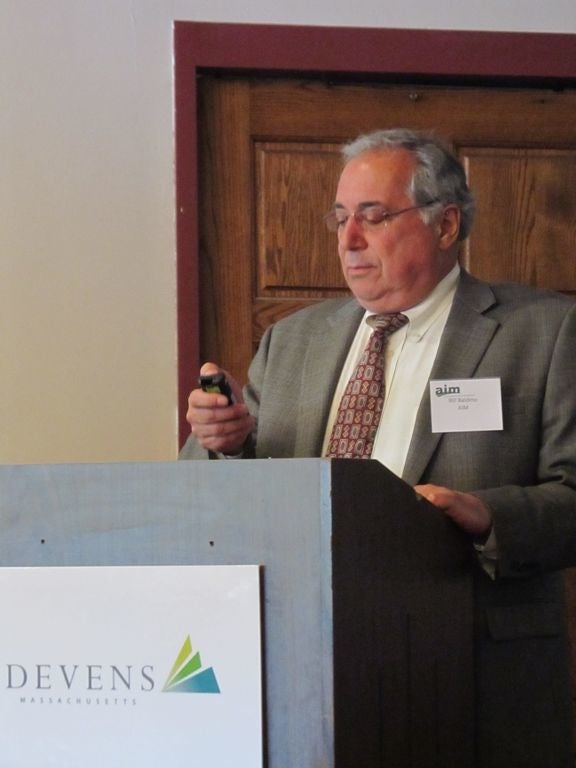Most Massachusetts manufacturers have little trouble finding or training qualified workers, according to the surprising results of a recent study.
A University of Massachusetts Dartmouth survey of 1,347 Bay State manufacturers found that only a third of respondents have trouble finding production workers, while just 20 percent lack the resources to train new employees.
“The problem is targeted,” Michael Goodman, chair of UMass Dartmouth’s department of public policy, told roughly 45 people during an event Thursday in Devens.
Bay State companies are increasingly leaning on their workers – and technological advances – to pick up the slack.
Despite losing 40,000 manufacturing jobs since 2009, the commonwealth’s gross manufacturing product has increased 18 percent, with the average employee handling 38 percent more product today than they did five years ago, according to Brian Gilmore, executive vice president of external relations for the Associated Industries of Massachusetts (AIM).
And nearly six in 10 manufacturers expect to increase the size of their workforce over the next two years, Goodman said, while less than one in 10 expects to employ fewer production workers.
The state enjoys a highly proficient manufacturing workforce today, Gilmore said, but questions remain about how the next generation of workers will fare.
Finding qualified employees appears to be more of a problem in Massachusetts than elsewhere, Goodman said, with just 20 percent of manufacturers nationwide reporting difficulties.
Workforce issues are most pronounced in the commonwealth’s largest sector – fabricated metals and machinery – where half of the firms have indicated they can’t find people with the know-how to weld or operate computer numerical control (CNC) machines, Goodman said.
And industry experts have detected cracks in the pipeline from the classroom to the factory.
A Massachusetts Manufacturing Extension Partnership (MassMEP) review of 13 of the state’s 30 vocational high schools with machine tool technology found across-the-board deficiencies, according to Leslie Parady, MassMEP’s project manager.
Specifically, Worcester-based MassMEP found that just 36 percent of seniors in Massachusetts vocational schools could demonstrate the skills needed for entry-level assembler and warehouse jobs. Parady said juniors should have received enough training to be capable of filling entry-level machine operator and inspector positions (which requires a higher competency).
Plus, New England has largely failed to cash in on the positive developments in the industry.
Manufacturing has enjoyed a resurgence in the Southwest due to energy, the Northwest due to the commercial airline business and the Rust Belt due to automobiles, said Mike Wilson, technology and innovation champion at the UMass Amherst Innovation Institute.
And the Southeast has benefitted from companies in re-shoring, or bringing their production facilities back stateside, due to political instability abroad. Many of the companies re-shoring today were founded in New England, Wilson said, but had relocated their production facilities to the Southeast before offshoring and therefore opted to return to below the Mason-Dixon Line.
The only selling point New England has, Wilson said, is a highly-skilled workforce.
“We’re a great state for inventing stuff,” said Lou Gaviglia, vice president of manufacturing strategic initiatives for MassDevelopment. “We’re a horrible state for making what we invent.”

